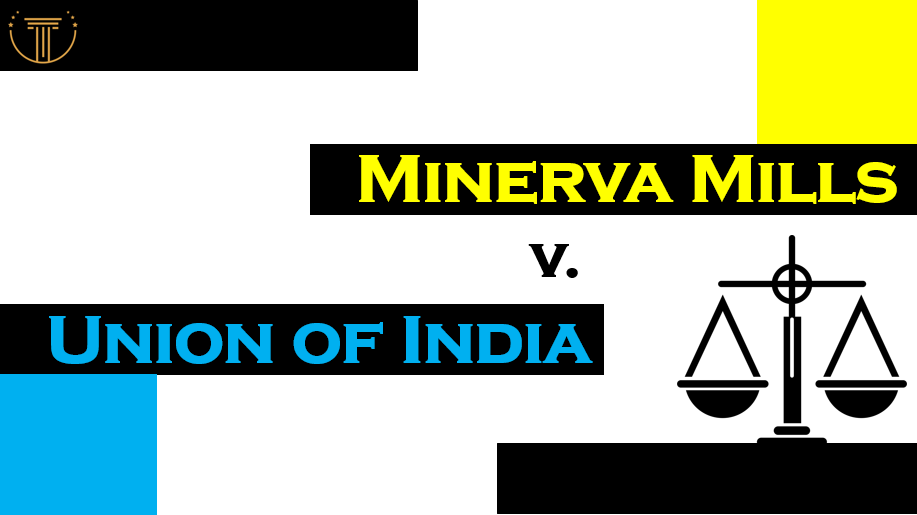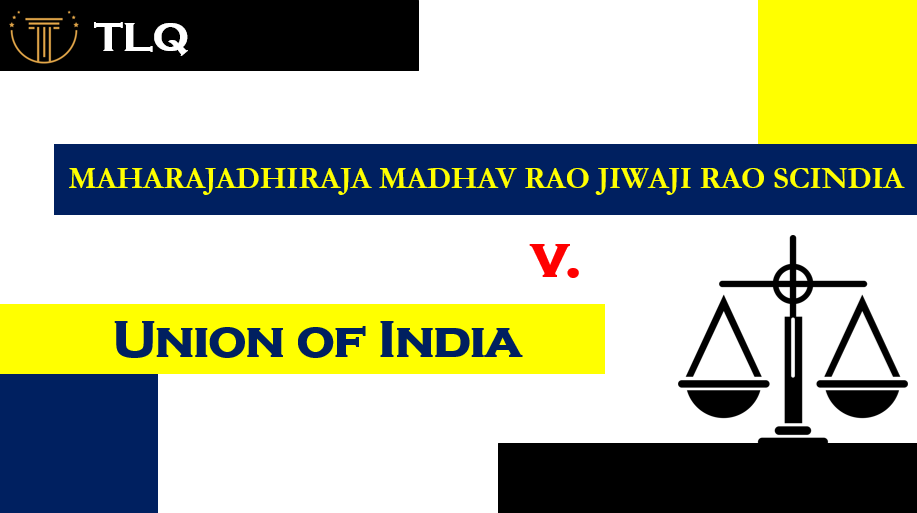Published On: 30th August, 2024
Authored By: Omisha Priya
Manikchand Pahade Law College, Chhatrapati Sambhaji Nagar, Maharashtra
INTRODUCTION
The ADM of Jabalpur, Shri Karan Vijay Singh was the one who put up the case in front of the Supreme Court and Shivkant Shukla was representing the detained members of the political background. The judgement of the case was amongst the darkest verdict ever given by the apex court of India. It ripped off the fundamental principles of democracy by stating a few optional provisions of the Constitution above individual dignity, security and liberty, thereby getting tonnes of criticism. The judges who gave their concurrence in favour of the state later apologised for their short-sightedness and misinterpretation of the rule of law. A government formed for the people, of the people and by the people suddenly started overruling their basic rights.
FACTS AND PROCEDURAL HISTORY
This paramount case of ADM (Additional District Magistrate), Jabalpur v. Shivkant Shukla (1976), prominently tagged as the Habeas Corpus Case, has its historical roots attached to the time even before the declaration of emergency by the then Prime Minister of India, Smt. Indra Gandhi in the year of 1975. In the case of State of Uttar Pradesh v. Raj Narain, the Lok Sabha election outcome was challenged before the Hon’ble Allahabad High Court and the electoral results were declared to be void. Justice Jagmohan Lal Sinha, convicted the victor Ms. Indra Gandhi for putting herself in the wrongdoings of the electoral procedure, by making her incapable of holding her office or contesting any election for a span of 6 years. Her appeal to the Supreme Court only provided her with a contingent stopover. Thus, to curtail the effects of the judgement and to get back her regime, she meticulously imposed a national emergency by citing the threat caused due to “internal disturbance”. Just after the imposition of the emergency, all the Fundamental Rights including the few necessary ones like- Article 14 (equality before the law and equal protection of the law), Article 19 (speech and press freedom), along with the Article 32 (the right to approach the Supreme Court for the sake of seeking remedy) were slammed. However, the government exercising Article 359 also suspended the statutory rights under Article 21, Article 22 and Article 226, which separately included the right to personal liberty, protection against preventive detention and the Writ Jurisdiction of the High Court. Nevertheless, these rights were necessary to uphold individual security, public tranquillity and national integrity over the state will.
Meantime, many critical opposition leaders in that dark period of illegal and mass detention were arrested and imprisoned even without trial, thus violating the principles of natural justice. Among them was one popular journalist namely Mr. L.K. Advani. Advocate Shri Shivkant Shukla filed a petition under the Maintenance of Internal Security Act (MISA), arguing that this detention was impugned as it violated the provisions of Articles 21 and 22. However, the Supreme Court of India ruled in favour of the government with a majority and hence failed to intervene in the superiority of individual rights against the state’s authoritarian and extraordinary powers to declare emergencies under Part XVIII of the Constitution.
ISSUE RAISED
- Whether the writ petition of Habeas Corpus under Article 226 be issued to ensure the liberty of a person if the detention orders are not done with a valid intention under the MISA along with the Presidential orders under Article 359 (1A)?
- Whether the Supreme Court of India have the jurisdiction to review the conditionality of the detentions held under the MISA and issued Presidential orders?
ARGUMENTS DONE AND THE RULE ESTABLISHED
The Petitioners argued that all the pleas regarding the intention and conditions would be quashed by virtue of the presidential orders passed. They also took the defence of the law and stated that no query arises as the law itself forbids the disclosure of the reasons for the detention on the grounds of the Presidential orders in order to maintain confidentiality in the public service and administration. Therefore, it was impossible for the High Courts to issue the writ of Habeas Corpus under Article 226 as the law forbids them to disclose the grounds of detention and the necessary information. Lastly, they put up a query before the coram that what is the rule of law principle and whether it is enshrined in our Constitution in a perceptible and segregated manner apart from Article 21, which itself remains suspended by the order of the President.
Whereas the respondents claimed that the Bombay High Court of Judicature heard the matter just on the basic points and not with the perspective of judicial investigation. Their arguments relied mainly on these points- examining the legal exercise of detention, whether it had any valid foundation or not as per the law point of view, the intelligence reports files related to the detention orders would have been submitted whose secrecy is without any reasonable doubt and under Part III, any fundamental right is not within the scope of Article 21 and this right isn’t the complete depository of the Right to Life and Personal Liberty. They also raised doubt on the enactment of Section 16A(9) of the MISA for providing a general exclusion from evidence.
Hereafter, on 28th April 1976, the Constitutional Bench consisted of 5 judges of the Supreme Court of India- Justice Ajit Nath Ray (CJI), Justice Yashwant Vishu Chandrachud, Justice Prafullachandra Natwarlal Bhagwati, Justice M. Hameedullah Beg and Justice Hans Raj Khanna. The verdict was passed with a majority of 4-1 in favour of the state, in which only Justice Khanna gave a dissenting view. The majority held that any writ petition under Article 226, moved by a person using the Locus Standi principle, isn’t valid if there has been an emergency held by order of the President and no person can challenge the legality of aforesaid order alleging that there was a mens rea behind it. Section 16A(9) was also upheld as a valid provision. On the other hand, Justice Khanna stated that citizen’s right to approach the court even after the invoking of Article 359(1) by the orders of the President, would not be taken away as Article 21 not only has the procedural but also has the substantive powers that can’t be curtailed by the state’s executive authority at any case except authorised by the law.
CRITICAL ANALYSIS OF THE IMPACT OF THE CASE
Article 21 was misinterpreted by the judiciary in this case by the four judges including the former Chief Justices of India. This is one of the most significant cases yet the most criticised judgment in the history of the Legal System of the Indian subcontinent. Nevertheless, what Justice Khanna did was truly a laudable act and he got appreciation not just in India but also throughout the whole world. He became a role model for all the citizens but at a very severe cost. In his Autobiography, Neither Roses Nor Thorns, he wrote that he is likely to lose the Chief Justice-ship of India because of his prepared judgement. Even after knowing this adverse outcome, he remained duty-bound and true to his oath. Consequently, he was supplanted by Justice M.H. Beg who was his colleague (but junior), in 1997 by the Indra Gandhi-led government for the post of Chief Justice of India.
However, under the ambit of the 44th Amendment Act (1978), it was held that the rights provided in Articles 20 and 21 are now meant to be kept untouched even during the emergency declared by the State, to prevent an innocent form illegal arrest and excessive punishment. Thus, it also nullified the judgement of the ADM Jabalpur Case.
CONCLUSION AND THE SUBSEQUENT OVERRULING JUDGEMENTS
Now, after this dreadful incident and with the passage of time, The Supreme Court of India passed the two landmark judgements that broadened and overruled the provisions of Article 21 in this case:
- Maneka Gandhi v. Union of India (1978)- This case is also known as the “Passport Case”. It was a 7-judge bench case wherein the provisions under Article 21 were upheld and widely interpreted, emphasizing the idea of a welfare state. With the addition of some secondary but important rights like the Right to Clean Drinking Water, the Right to a fair and speedy trial, the Right to a Clean and Pollution Free Environment, the Right to Food, the Right to Free Medical and Legal Aid, etc. the Article 21 was adorned.
- K.S. Puttaswamy v. Union of India (2017)- The case is commonly called “The Right to Privacy Case” or “The AADHAR Card judgement Case”. It was a Judgement consisting of a 9-judge bench that reversed the order of the ADM Jabalpur Case. Interestingly, the son of Justice Y.V. Chandrachud, Justice D.Y. Chandrachud was one of the judges who gave his judgement in the Right to Privacy Case and hence contributed to reversing the order of the Habeas corpus Case!
Hence, it can be concluded that even after applying any provision of any Act or any Presidential order(s), the individual right lies all above the will of the executive working under the State as per the established law.


